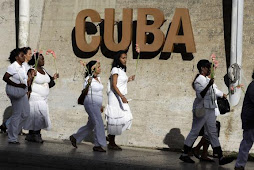2 Cuban dissidents up for election in unprecedented vote
BY ANNE-MARIE GARCIA AND MICHAEL WEISSSENSTEIN ASSOCIATED PRESS
04/18/2015 12:21 PM 04/18/2015 12:22 PM
HAVANA
At least two dissidents made it past a first round of voting and are
standing as candidates in municipal elections that will be watched on
and off the island Sunday as an unprecedented test of Cuba's
single-party system.
Both men told The Associated Press that they expect to win the second
round and become the first officials elected from outside the Communist
Party since the first electoral law was established by Fidel Castro's
government in 1976. Outside observers said the mere fact that dissidents
Hildebrando Chaviano and Yuniel Lopez are on the ballot is the first
indication Cuba's leadership may be softening at least the appearance of
its monolithic control of politics.
"This wasn't an accident, especially since it's two different people,"
said Ted Henken, a Cuba expert at Baruch College in New York. "I think
the government is taking the challenge instead of silencing it. It can
be portrayed as a further sign of liberalization."
President Raul Castro began slow-moving but wide-ranging reforms in the
centrally planned economy in 2010. He also promised changes to the
electoral system but has provided no details to date.
Chaviano, 65, and Lopez, 26, said they think the government simply was
caught off guard by the support for their candidacies in the first round
of candidate selection, which is done at gatherings of neighbors at the
district level. They said local officials didn't have time to organize
enough to stop them.
"Some people say that there's fear in Cuba, and I say that people have
lost a lot of their fear," said Lopez, an unemployed member of the
three-decade-old Independent and Democratic Cuba Party. "I already feel
like I've won."
Chaviano, a government lawyer turned independent journalist, said he was
seizing an opportunity provided by both the letter of Cuban law, which
offers theoretical protection to independent candidacies, and by the
mood of historic change that has followed the Dec. 17 announcement by
Castro and President Barack Obama of detente after a half-century of
enmity between Cuba and the U.S.
Obama has said warming ties with Cuba will bring political change to the
island faster than the Cold War policy aimed at overturning Castro's
government.
"We have to take advantage of the moment," Chaviano said. "The same as
Obama wanted, we're going to move things a bit ... No one from the
government was expecting us to be nominated and even less that we would
become candidates."
In response to their dissidents' candidacies, Cuban media and electoral
officials have been publishing disparaging information about the two
men, including in the official candidate biographies hung by the
government around their electoral districts in place of campaigning,
which is barred by Cuban law.
At the same time, state media have been touting their appearance on the
ballot as a sign that Cuba's electoral system is really free and not a
faux-democratic cover for total single-party control as many outside
observers describe it.
"The exception proves the rule, and the rule is and will keep being the
overwhelming support for Cuba's political and social system,"
editorialist Eduardo Gonzalez said in a commentary Thursday night on
Havana's local Radio Coco. "The exception, in this case, also confirms
the democracy of our electoral system, which has room for improvement,
like everything man-made."
Chaviano and Lopez are running for seats on municipal assemblies, a sort
of neighborhood council that oversees local matters like water, sewers,
street repair and insect fumigation.
Municipal assemblies also nominate candidates for half the
representatives on provincial assemblies. The provincial assemblies then
nominate candidates for half the representatives for the National
Assembly, which elects Cuba's ruling Council of State, which in turn
elects the president.
The other half of the candidates for the municipal and provincial
assemblies are selected by a government electoral commission, assuring
continued Communist Party control.
Once all of the candidates are nominated, voters choose among them in
general elections.
Every municipality is divided into block-level voting districts. The
two-month process of electing municipal assembly representatives begins
when residents gather in an empty lot or at a school to nominate
neighbors as candidates. Each district picks at least two candidates —
more populous ones have more.
The top winners of show-of-hands votes at the meetings became the
official candidates put before voters in Sunday's election. In all,
there are 27,000 candidates to fill 12,589 seats on municipal assemblies
for 2½-year terms.
Voting is secret and the public can witness the count under Cuban law.
"I'm going to be at the polling station until it closes," Lopez said.
"And when it does I'll watch them count the vote."
---
Associated Press correspondent Milexsy Duran contributed to this report.
Source: 2 Cuban dissidents up for election in unprecedented vote | Miami
Herald Miami Herald -
http://www.miamiherald.com/news/nation-world/article18854766.html
Subscribe to:
Post Comments (Atom)





No comments:
Post a Comment